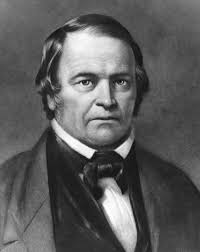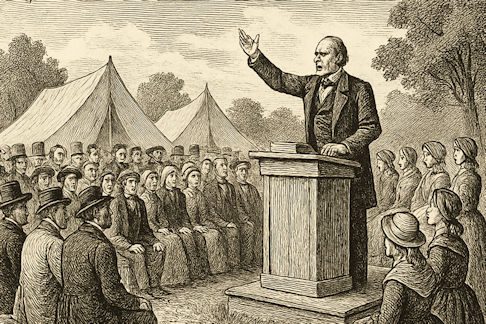About Us
Humble Beginnings

William Miller
The Seventh-day Adventist denomination is deeply rooted in Protestantism, and grew out of the spiritual revival that started in the U.S., and lasted from the late 1700’s to the mid 1800’s.
This spiritual awakening was fueled by the study of Bible prophecy, mainly from the books of Daniel and Revelation. In the 1830’s, a devout Baptist named William Miller began earnestly studying the “2300 Day prophecy” found in Daniel 8 and 9 (Daniel 8:14). Miller became convinced that this prophecy predicted the exact date of the Second Coming.
By the early 1840’s Miller had grown his evangelistic ministry, and had many followers who were moved by his biblical teachings; they were called “Millerites”. The Millerites, through their interpretation of Daniel, determined the date of the Second Coming to be October 22, 1844. However, as anyone can plainly see, Jesus did not come back that day.
Deeper Bible Study
This “non-event” came to be known as “the Great Disappointment”. As you can imagine, that moniker barely scratched the surface of the grief experienced by the believers who left everything to go meet Jesus that day. While they were all heartbroken, out of this Great Disappointment came even greater and deeper Bible study to determine where they miscalculated this long-awaited event.
Out of this deeper study, the Seventh-day Adventist (SDA) Church was eventually formed, and established the denomination in the spring of 1863. Founded on the principles of evangelism, mission, and our unique health message, the church grew into a world-wide movement from just over 16,000 members in the 1870’s, to over 20 million members today.


This “non-event” came to be known as “the Great Disappointment”. As you can imagine, that moniker barely scratched the surface of the grief experienced by the believers who left everything to go meet Jesus that day. While they were all heartbroken, out of this Great Disappointment came even greater and deeper Bible study to determine where they miscalculated this long-awaited event.
Out of this deeper study, the Seventh-day Adventist (SDA) Church was eventually formed, and established the denomination in the spring of 1863. Founded on the principles of evangelism, mission, and our unique health message, the church grew into a world-wide movement from just over 16,000 members in the 1870’s, to over 20 million members today.
Continuous Growth

The Adventist Church continues to grow globally, maintaining its focus on health and wellness, community development and mission work, publishing, and education. The Church currently operates over 8,000 schools around the world, nearly 200 hospitals, and over 50 publishing houses. According to Pew Research, the Seventh-day Adventist denomination is the most ethnically diverse Christian denomination in the world.
With a rich history of dedicated Bible study (including an emphasis on Bible prophecy), and a commitment to applying biblical principles to daily life, Adventists remain an active, dedicated global faith community. Together they cling to Jesus as their only hope and eagerly await His Second Coming.
Church Doctrine
For Seventh-day Adventists, the Bible is more than just a book.
The Bible is the ultimate guide to faith and practice. We believe it provides clarity, inspiration, and direction in understanding God's will for humanity. Personal testimonies reveal how individuals have found profound freedom and hope from scripture, allowing them to navigate life's challenges through its teachings.
Several key principles form the backbone of our beliefs, including:
- Salvation through Faith. (Ephesians 2:1-10)
- The Nature of God existing in Three Persons: The Father, Son, and Holy Spirit. (Exodus 3:13-15) (John 8:58) (John 14:15-17)
- Sabbath Observance. (Genesis 2:1-3) (Exodus 20:8-11)
Sabbath is central in Seventh-day Adventists beliefs
It symbolizes not only rest but also a time for spiritual renewal and fellowship. Observing the Sabbath allows us to step away from the rush of everyday life, fostering peace and connection with God and family. It is a cherished tradition that serves as a weekly reminder of God's creation and grace.


For Seventh-day Adventists, the Bible is more than just a book.
The Bible is the ultimate guide to faith and practice. We believe it provides clarity, inspiration, and direction in understanding God's will for humanity. Personal testimonies reveal how individuals have found profound freedom and hope from scripture, allowing them to navigate life's challenges through its teachings.
Several key principles form the backbone of our beliefs, including:
- Salvation through Faith. (Ephesians 2:1-10)
- The Nature of God existing in Three Persons: The Father, Son, and Holy Spirit. (Exodus 3:13-15) (John 8:58) (John 14:15-17)
- Sabbath Observance. (Genesis 2:1-3) (Exodus 20:8-11)
Sabbath is central in Seventh-day Adventists beliefs
It symbolizes not only rest but also a time for spiritual renewal and fellowship. Observing the Sabbath allows us to step away from the rush of everyday life, fostering peace and connection with God and family. It is a cherished tradition that serves as a weekly reminder of God's creation and grace.
End-Time Prophecy

Empires of Time
Each section of this statue represents the empires that would come and go throughout history, until the return of Jesus, as described in Daniel 2:31-45
Interpretation of Key Prophecies in the Bible
Eschatology, the study of end-time events, plays a significant role in Seventh-day Adventist beliefs. Members view the future through a lens of hope, understanding that God has a plan for humanity. All believers should find comfort in the promise of Christ's return, which is perceived as a hopeful conclusion to the struggles of life. This understanding encourages a lifestyle of readiness and faithfulness as they await the fulfillment of divine promises.
The focus for Prophecy is always that Jesus will return. Through deeper study of the Books of Daniel and Revelation we get a historical context of prophesied events that have happened, and look forward to those prophecies that have not yet happened, and be ready for them.
We know that time is running short based on the kingdoms outlined in Daniel 2, and further defined in Daniel 7. These same kingdoms are referenced in Revelation 13.
The main point of understanding Bible Prophecy isn't to know the exact date of Jesus' return, it's to be ready for Him when He comes as outlined in the Three Angels Message of Revelation 14:6-12.
The Second Coming of Christ is a pivotal doctrine in Seventh-day Adventism, viewed as the culmination of divine promise and hope. Believers eagerly anticipate Jesus’ return, which we see as a transformative event that will bring justice and restore peace.
(Matthew 24:29-31) (1 Thessalonians 4:16-17)
Health and Lifestyle

Health Principles in Seventh-day Adventist Lifestyle
Health is a cornerstone of Seventh-day Adventist beliefs, with many members living by lifestyle principles that promote physical and spiritual well-being. The emphasis is on a balanced diet, regular exercise, and mental wellness.
Key principles include encouraging a plant-based diet, regular physical activity, as well as rest and relaxation to promote mental health. All of our health principles are rooted in Scripture such as 1 Corinthians 6:19-20 and Genesis 1:29.
The Bible reinforces the belief that maintaining health is a spiritual obligation, prompting us to care for our bodies as an act of worship. This commitment to health not only fosters individual well-being but often enhances community engagement and outreach.
